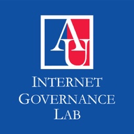By Kenneth Merrill
Following last Monday’s racist incident on campus and subsequent online harassment directed at AU Student Government President Taylor Dumpson, American University hosted a Facebook Live video event on Friday outlining practical steps students can take to protect themselves from online hate.
Vice President for Communication Terry Flannery and Assistant Director of Physical Security and Police Technology Doug Pierce touched on several actions the university is taking to protect students, both on campus and online, while also addressing best practices students can adopt to protect themselves in the offline and online worlds.
Mr. Pierce highlighted the importance of actively managing one’s privacy settings on social media platforms like Facebook, Instagram, Twitter, and Snapchat, including disabling geolocation, which raises the risk that online threats could develop into real-world threats to a victim’s physical security.
In what was a concerted effort to engage with the university community in an open and transparent manner, Ms. Flannery and Mr. Pierce took questions from users posted in real-time, many of whom expressed a growing sense of frustration over the larger issues of hate and fear bubbling up on campus and beyond. Echoing these sentiments was a general sense of disillusionment as to the efficacy of one-off discussions (no matter how well-intended) in response to what many see as merely the latest in a string of incidents reflecting deep-seated divisions on campus.
Addressing the larger political and social context, Ms. Flannery explained, “I think so much has been affected by the current political climate that we’re in. And I’ve seen many people who’ve, in their social media streams, talk[ed] about how they’re taking a break because the heated rhetoric following the election resulted in just the kind of heated emotion that was difficult. But this is different, what we’re talking about now. We’re talking about people who are targeting you personally because of what you represent or particular views, or your identity based on race, or other factors. And so I think it’s a particularly egregious form of hate; and a particularly personal form of hate.”
Identifying strategies for dealing with direct online harassment, Mr. Pierce suggested avoiding engagement with perpetrators and so-called trolls. “Don’t respond to the messages from these people who are trolling you and trying to provoke a reaction. That reaction is exactly what they’re trying to achieve by doing this. So the goal would be to not give them that satisfaction.”
But several students balked at the notion of self-censorship in the face of deplorable expressions of hate. “We shouldn’t have to hide ourselves online or in person,” wrote one commenter, highlighting the difficulty and dissonance many social media users experience when balancing tradeoffs like privacy versus security online.
“We tend to pit participation on these platforms against protection… that more of one requires less of the other,” explains Internet Governance Lab affiliated alumna Dr. Tijana Milosovic, a post-doctoral fellow in the Department of Communication at the University of Oslo who studies online hate and cyberbullying (she received her Ph.D. in Communication Studies from AU in 2015). “From what I have seen, the Facebook talk given by AU administrators focuses to a large extent on safety and security–framing the problem in this way. It is, of course, important to point out these security-related aspects, with advice for students on how to protect themselves and to ensure that everyone is safe and feels safe. However, I think we should be cautious not to forget the cultural aspect of it.”
And while framing the discourse of hate, whether online or offline, is increasingly difficult given the labyrinthine and constantly shifting web of actors seeking to pollute the public sphere with vitriol, Dr. Milosovic argues that combating it requires a more holistic approach. “We tend to forget the aspects of our culture that normalize humiliation. I think this is very evident with the new administration–normalizing and implicitly (or even explicitly!) sanctioning such behavior… Creating a culture (not just on campus but more widely, in the society) where these hate-related problems are openly talked about is very important as well.”
